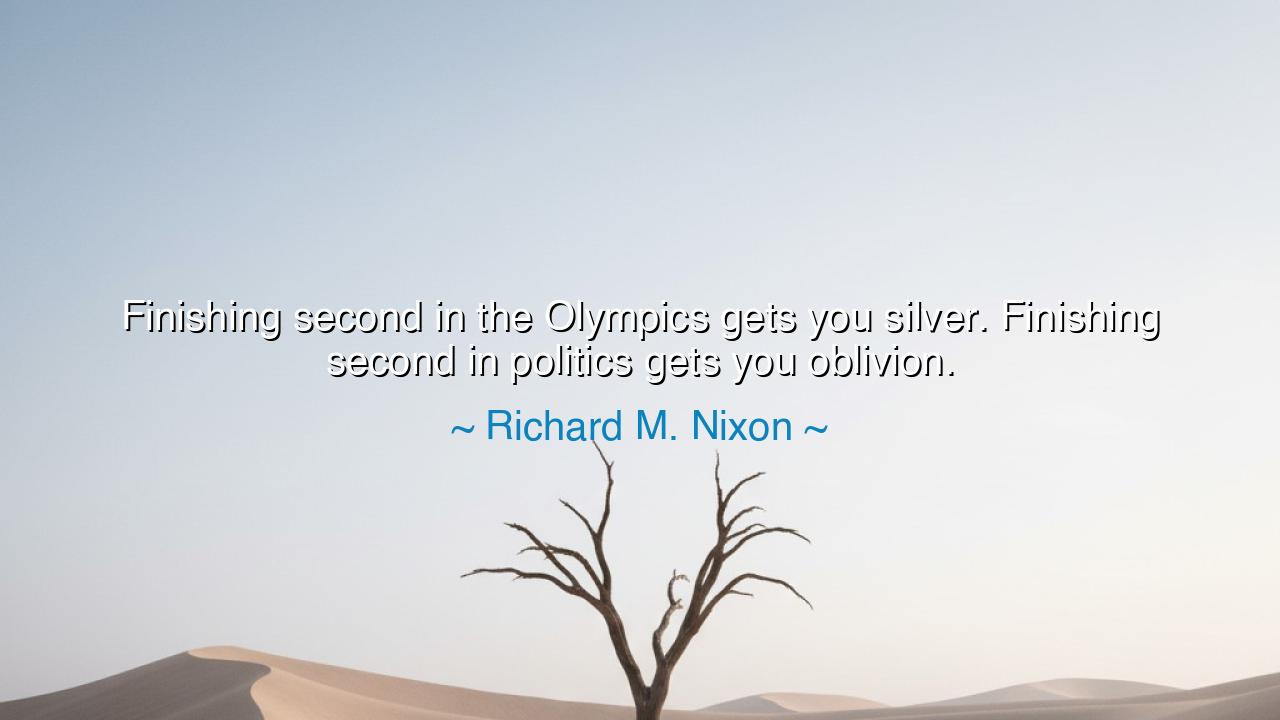
Finishing second in the Olympics gets you silver. Finishing
Finishing second in the Olympics gets you silver. Finishing second in politics gets you oblivion.






O children of the earth, listen to the words of Richard M. Nixon, a man who, like many before him, understood the harsh realities of both victory and defeat. He declared, "Finishing second in the Olympics gets you silver. Finishing second in politics gets you oblivion." In this, he speaks not of medals or trophies, but of the cruel truth that in the realm of politics, second place is not a position of honor, but one of erasure. For in the world of power, where the stakes are high and the competition fierce, there is no room for half-measures, no room for the also-rans. You are either the leader, or you are forgotten.
In the Olympics, the silver medal represents achievement. It signifies that the athlete has soared, has given their all, and has earned recognition for their effort. Yet, in politics, second place is a far different beast. The realm of governance and power is unforgiving. The public is fickle, and the political stage offers no solace to those who have failed to claim the top spot. Nixon, who tasted the bitterness of defeat in his race for the presidency, knew all too well that in the world of politics, second place is not a mark of honor, but a quick descent into the shadows of oblivion, where the world forgets those who did not seize the reins of power.
Consider the great Julius Caesar, who, though once second to Pompey in the Roman Triumvirate, could not be content with merely sharing power. He sought the crown of Rome for himself, and in doing so, changed the course of history. For in the realm of politics, to stand in second place is to remain tethered to the whims of those in first, to live under the shadow of someone else’s will. Caesar, in his ambition, understood that political power was not a shared victory, but a singular conquest, and he would never be content as the second to anyone.
Nixon’s own rise and fall echo the harsh truth of this quote. Though he climbed the heights of power, his fall from grace during the Watergate scandal was a reminder that in politics, second place often means irrelevance. He was once second to John F. Kennedy in the 1960 presidential election, but later ascended to the highest office. Yet when he lost his place through scandal and disgrace, his once-immense influence was diminished to near oblivion, the very fate he warned would befall those who settle for second place.
So, O children, let us heed this wisdom in all the walks of our lives. The Olympics may honor the second-place finisher with silver, but the political world offers no such grace. Power is not shared; it is either held or lost. If you seek to change the world, to leave your mark, you must aim for the top, for there is no room for those who settle for less. Let this be a lesson in the importance of ambition, the necessity of striving, and the unforgiving nature of politics. Only those who claim the crown shall be remembered; the rest will fade into the dust of time.






THPham Thi Huyen
Nixon’s comment reflects the cutthroat nature of politics, but I wonder if it’s always been this way or if it’s a product of the modern, media-driven landscape. Politics today feels more like a spectacle, and losing can mean being erased from public memory. But how do we shift the focus from 'winning at all costs' to something that allows space for second chances and growth in politics? Is it even possible to have a healthier approach?
Ttranthuyan
This quote feels cynical. It’s true that in some ways, political defeat can erase a career, but does it really have to be that way? What if second place in politics could still lead to meaningful roles in government or public life? Could there be a more supportive, constructive view of second place in politics, like there is in sports? How might this change the way we view political participation and leadership?
LNTruc Ly Nguyen
I’m not sure if I completely agree with Nixon’s take. In politics, I think being in second place still allows for influence, especially if you're able to leverage that position for future opportunities. But I do see his point—second place might not get you the ultimate prize, and there’s a lot of public pressure. Do you think that kind of pressure harms our democratic systems or drives better candidates to step up and truly fight for the top spot?
PMnguyen Phuong Mai
This quote is pretty brutal but also quite insightful. Why is second place in politics perceived so negatively? It’s as if political success is measured only by the ultimate victory, whereas in sports, there’s honor in being the runner-up. Could this be why politics often feels like such a zero-sum game? Does it discourage collaboration or compromise, since only the top position matters so much in the public eye?
KPKim Phuong
Nixon’s words seem harsh, but they might be true in the context of politics. In sports, we often celebrate second place as a huge accomplishment, but in politics, coming close can feel like a failure. Is it because political office is seen as a 'winner-takes-all' game, where only the top position matters? I wonder if this mindset harms the political system by discouraging meaningful participation from those who might be great leaders but not necessarily able to win an election.